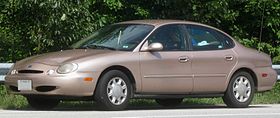Ford Taurus (third generation)
| Ford Taurus (third generation) | |
|---|---|
 |
|
| Overview | |
| Manufacturer | Ford |
| Production | June 19, 1995–September 1999 |
| Assembly |
Atlanta Assembly, Hapeville, Georgia, U.S. Chicago Assembly, Chicago, Illinois, U.S. |
| Designer | Doug Gaffka (1991, 1992) |
| Body and chassis | |
| Class | Mid-size |
| Body style | 4-door Sedan 5-door Station Wagon |
| Layout | FF layout |
| Platform | Ford D186 platform |
| Related |
Mercury Sable Ford Taurus SHO Lincoln Continental Ford Windstar |
| Powertrain | |
| Engine | 3.0 L SFI Vulcan V6 3.0 L DOHC Duratec 30 V6 |
| Transmission | 4-speed AX4N automatic 4-speed AX4S automatic |
| Dimensions | |
| Wheelbase | 108.5 in (2,756 mm) |
| Length | Sedan: 197.5 in (5,016 mm) Station wagon: 199.6 in (5,070 mm) |
| Width | 73.0 in (1,854 mm) |
| Height | Sedan: 55.1 in (1,400 mm) Station wagon: 57.6 in (1,463 mm) |
| Chronology | |
| Predecessor | Ford Taurus (second generation) |
| Successor | Ford Taurus (fourth generation) |
The third-generation Ford Taurus is an automobile that was manufactured by Ford from 1995 to 1999.
The third generation of Ford Taurus was the first to be completely redesigned from the ground up, and used a rounded, oval-derived design that was very controversial at the time, considered to be the main reason for this model's downfall in the market. It was designed to appeal to buyers of the Toyota Camry and Honda Accord — both of which were similarly styled — as well as to make Ford a design leader in the North American market, a title that was attributed to the Chrysler Corporation. Among the most controversial features of the design were both the front fascia that was composed of separate circular headlights, circular turn signals and the oval shaped rear window (the Sable, unlike the Taurus, had a more conventional window).
This generation of Taurus was released for sale in late 1995 to mixed reactions from consumers. It managed to retain its status as the best selling car in America through the 1996 model year; however, this was achieved through heavy sales to car rental companies: only 49% of Taurus sales in 1996 were to private customers. Because of this, the Taurus lost its bestseller status in 1997 to the Toyota Camry. This generation of Taurus continued to be sold until 1999, only around 370,000 of them had been sold, it was replaced with the fourth-generation Ford Taurus.
Development for the third-generation Taurus began in 1991, and its designers and engineers believed that they were faced with a daunting task; they compared completely redesigning the Taurus to repainting the Mona Lisa. Like the first-generation Taurus, the new Taurus was developed by a team effort, in which the exterior and interior designers, engineers, and marketing staff had input on the new car.
Many designs were considered during the development process, from designs that resembled the second generation cars, to more radically styled cars. They eventually decided on a radical new styling scheme based upon oval derived design elements, which would prove to be the car's Achilles heel in the marketplace. Chief designer Jack Telnack, who oversaw the development of the first and second generation Taurus, said that his Taurus was designed the way it was to stand out in the marketplace, and that the use of the oval was becoming the new global design theme for Ford.
...
Wikipedia
